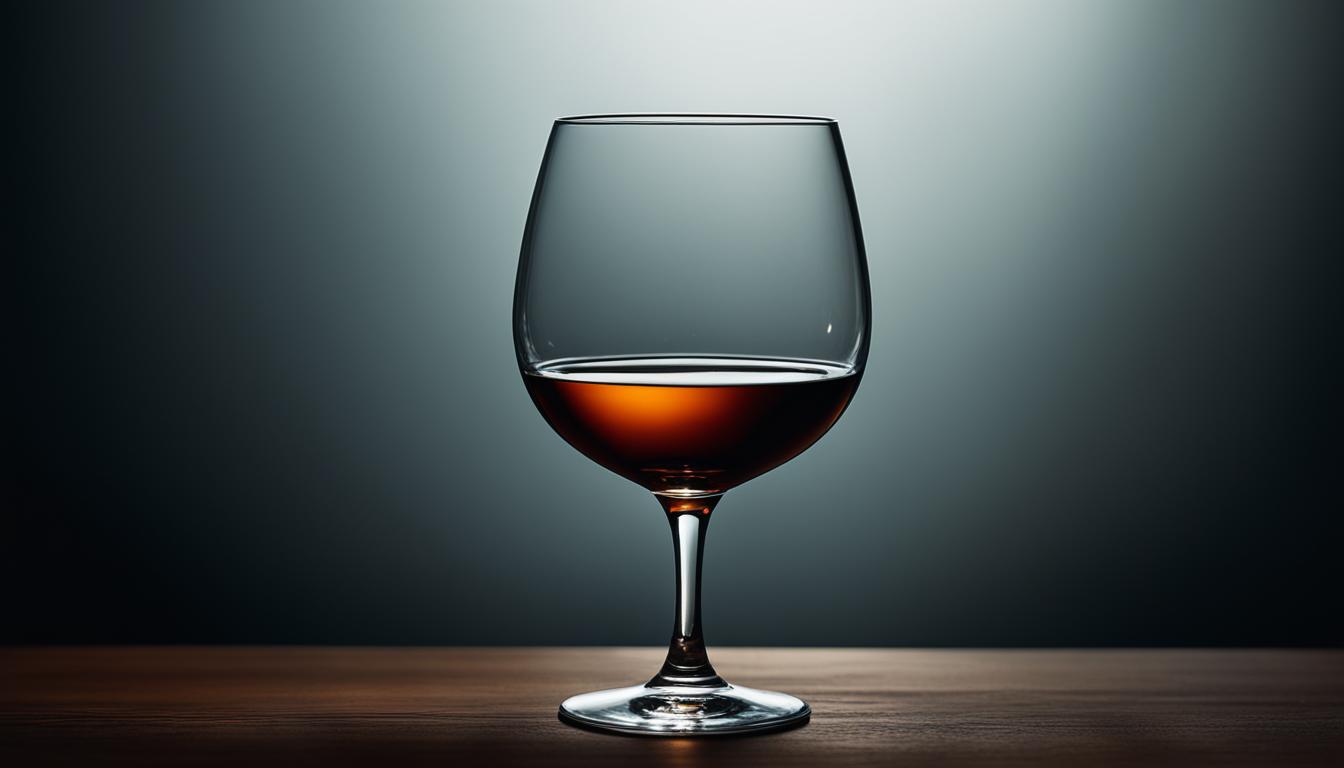Originally posted on January 24, 2024 @ 7:45 am
Toasting with an empty glass is a common practice that holds cultural significance in many societies. However, there are superstitions and beliefs surrounding the act of toasting without a drink that link it to bad luck and even death. These beliefs have been passed down through generations and are deeply rooted in drinking etiquette and superstitions. In this article, we will explore the cultural significance of toasting, the superstitions surrounding empty glass toasts, and the various drinking customs across different cultures.
Key Takeaways:
- Toasting with an empty glass is believed to bring bad luck or even death in many cultures.
- This superstition has historical roots and is deeply ingrained in drinking etiquette and customs.
- Various traditions and beliefs exist around toasting in different cultures, adding unique twists to the practice.
- Drinking customs and expectations vary across cultures, and it is important to navigate toasting appropriately.
- Regardless of the superstitions, toasting is a universal tradition that celebrates and brings people together.
The Superstition of Toasting with Water
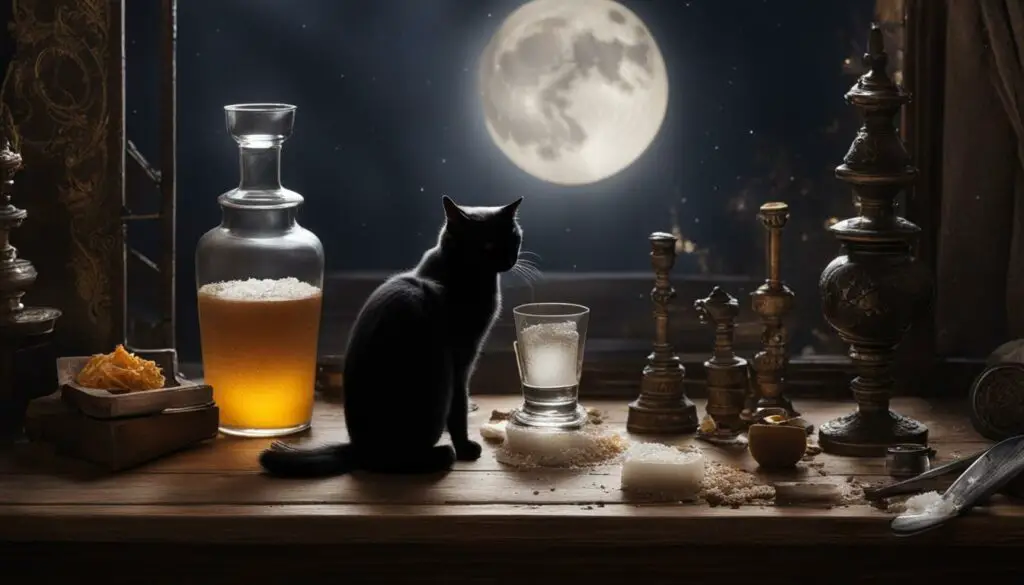
Toasting with water has long been associated with bad luck and superstition in many cultures. One of the most notable instances is found in Greek mythology, where toasting with water was believed to be connected to death and considered a wish for misfortune. This belief in the ill fate associated with toasting using water has even pervaded into the U.S. Navy, where it is strictly forbidden to engage in such a toast. The superstition surrounding toasting with water has also made its way to other countries, including Spain, where it is believed that toasting with water or non-alcoholic drinks can result in seven years of bad sex. These deeply ingrained beliefs and customs surrounding toasting with an empty glass highlight the enduring power of superstition in various cultures.
In Greek mythology, the act of toasting with water was connected to death and the voyage of the dead to the Underworld. This ancient belief has carried over into modern times, where toasting with water is seen as a potential harbinger of ill luck or even demise. The myth has become deeply ingrained in cultural traditions, leading to the widespread avoidance of toasting with an empty glass or water-filled vessel.
Superstitions surrounding toasting with water are not confined to Greek mythology. In the U.S. Navy, it is considered bad luck to engage in a toast with water, further perpetuating the belief that toasting in this manner invites misfortune.
This superstition has also prevailed in other parts of the world. Spain, for instance, embraces the belief that toasting with water or non-alcoholic beverages can lead to seven years of unsatisfying sexual experiences. These cultural customs and the associated consequences underscore the significance and enduring influence of superstition when it comes to toasting.
Cultural Significance of Toasting

Toasting is a universal tradition that holds great cultural significance across different societies and communities. It serves as a way to celebrate special moments, bring people together, and show respect to others. Whether it’s raising a glass during a wedding toast, a birthday celebration, or a business gathering, toasting is an expression of goodwill and camaraderie.
Beliefs and customs associated with toasting vary from culture to culture, adding unique flavors to this age-old tradition. For instance, in some cultures, toasting involves clinking glasses, while in others, it may require making eye contact. Phrases like “cheers,” “salud,” and “prost” are commonly used as part of the toasting ritual, each carrying its own cultural significance.
“Toasting is not just a gesture of celebrating a moment, it’s a way of honoring the person being toasted.”
The act of toasting has evolved over time. It has transformed from a simple raising of glasses to a more elaborate affair, often accompanied by heartfelt speeches or wishes. The toasting ritual symbolizes unity, friendship, and shared joy, creating a memorable atmosphere during special occasions.
Customs and Beliefs around Toasting
Customs and beliefs associated with toasting add depth and meaning to this universal tradition. For example, in some cultures, it is customary to make eye contact with everyone at the table while toasting as a sign of respect. This tradition fosters connections and ensures that everyone feels included in the celebration.
Additionally, toasting often involves the clinking of glasses. This action is believed to have originated from the ancient belief that making a noise with glasses would ward off evil spirits. The clinking sound creates a joyful atmosphere, further enhancing the celebratory nature of the moment.
Toasting is also a way to honor individuals or groups, such as toasting to the bride and groom at a wedding or to the success of a business venture. It is a heartfelt gesture that shows appreciation and recognition of important milestones and achievements.
The cultural significance of toasting is ingrained in people’s daily lives, from family gatherings to formal events. It serves as a bridge that connects individuals, transcending language barriers and bringing people from diverse backgrounds together in a spirit of unity and celebration.
Throughout history, toasting has played a significant role in various cultural rituals and traditions. It holds a place of importance in religious ceremonies, social gatherings, and even diplomatic events. The beliefs and customs associated with toasting have become an integral part of many cultures worldwide.
The Art of Toasting: An Expression of Joy and Unity
The act of toasting is an art form that represents shared joy and unity. It goes beyond the mere act of raising a glass; it is about cherishing the moment, expressing gratitude, and connecting with others.
As individuals gather and celebrate, toasting serves as a reminder of the bonds that unite us all. It is a symbol of friendship, love, and respect across cultures, transcending borders and language barriers.
So the next time you raise your glass to toast, remember the cultural significance behind this age-old tradition. It is a gesture of goodwill, a way to honor others, and a reminder of the joy and unity that exists in our world.
The Origins of Toasting
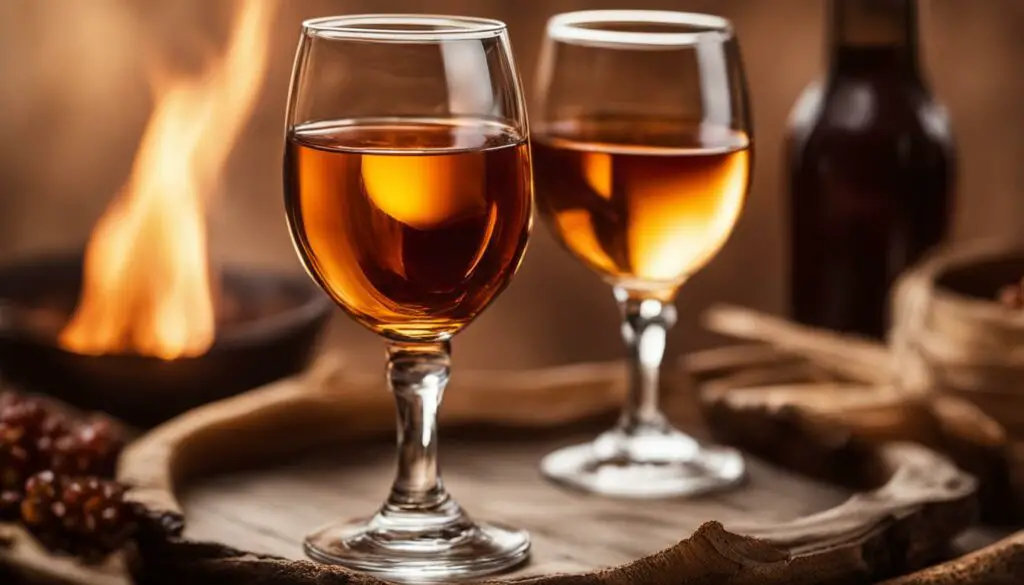
The tradition of toasting is steeped in history and myth, with various theories surrounding its origin. One belief is that toasting began as a form of sacrificial libations offered to the gods in ancient times. This practice involved pouring a small amount of drink as an offering, ensuring the gods’ favor and protection.
Another theory suggests that toasting emerged as a way to ensure drink safety. In earlier times when drinks were not always reliable, it became customary to spill a small portion from each glass into the others as a gesture of trust and camaraderie.
One popular story dates back to the 17th century when drinks were often flavored with pieces of toast. This led to the term “toasting,” as the toasted bread imparted a pleasant aroma and flavor to the beverages.
Regardless of its precise origins, toasting has evolved into a beloved tradition embraced across cultures and is practiced during various celebrations and gatherings worldwide.
History and Myth Surrounding Toasting
“The act of toasting has a rich history and has been infused with myth and symbolism throughout the ages. From its ancient origins in sacrificial offerings to its evolution as a gesture of trust and celebration, toasting has become an integral part of social gatherings.”
Throughout history, toasting has held different meanings, from honoring achievements to expressing goodwill and camaraderie among friends and loved ones. It has become a way to celebrate special occasions, mark milestones, and show appreciation for the people in our lives.
Toast Here, Toast There, Toast Everywhere!
The act of raising a glass and offering a toast is a universal practice. It transcends borders and brings people together, fostering a sense of unity and shared celebration. Whether it’s a wedding, a birthday, a holiday, or a simple gathering of friends, toasting adds an element of joy and significance to the occasion.
Beliefs and customs surrounding toasting may differ from culture to culture, but the essence remains the same – to express good wishes, honor, and appreciation. So, next time you raise a glass for a toast, remember the rich history and traditions that have shaped this timeless tradition.
Unique Traditions Around Toasting
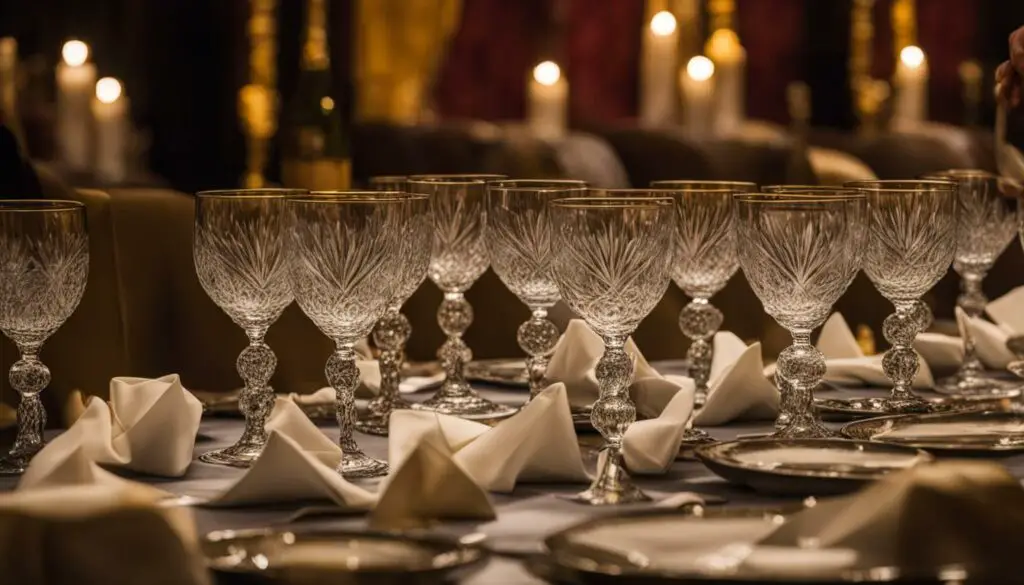
While toasting is a universal practice, some cultures have added their own unique twists to the tradition. These traditions add an extra level of fun and excitement to the act of toasting, making it an unforgettable experience.
Ukraine and Russia: Wishes in Ashes
In Ukraine and Russia, people have a special tradition when toasting on New Year’s Eve. They write down their wishes for the coming year on a piece of paper, burn it, drop the ashes in a glass of Champagne, and drink it at midnight. It is believed that by consuming the ashes, their wishes will come true, bringing luck and prosperity in the new year.
Australia: Playful Insults
Down under in Australia, toasting is accompanied by playful insults among friends. During a toast, it is common for Australians to call out phrases like “Cheers, Big Ears!” and “Same goes, Big Nose!” These lighthearted and humorous taunts add a touch of camaraderie and laughter to the celebratory atmosphere.
These unique traditions around toasting showcase the diversity and creativity of different cultures, making the act of raising a glass even more memorable and enjoyable.
The Role of the Toastmaster in Georgia

In Georgia, the tradition of toasting holds a special place in their culture, and the role of the toastmaster, known as the Tamada, is of utmost importance. During a feast called a supra, the Tamada leads the guests in a series of toasts, creating a lively and celebratory atmosphere.
Unlike in many other cultures, the Georgian toastmaster’s duty extends beyond simply raising a glass and giving a brief speech. The Tamada performs a central role in orchestrating the toasting proceedings, ensuring that every guest gets their turn to make a toast.
The toasts in a Georgian supra can number as many as 30, involving toasts to friends, family, and important figures, both living and deceased. Each toast is filled with heartfelt sentiments and well-wishes, creating a sense of unity and connection among the participants.
One unique aspect of Georgian toasting is that the Tamada is expected to empty their glass completely after each toast. However, it is important to note that they must not get drunk during the course of the supra. This tradition showcases the respect and dedication the Tamada has towards their role as the toastmaster.
It’s interesting to note that beers are not commonly used for toasting in Georgia. It is believed that toasting with beer can bring bad luck to the recipient. Instead, Georgian toasts are made with traditional Georgian wines, such as Saperavi and Rkatsiteli, or with other local spirits like Chacha.
The tradition of the Tamada and the lively supra feasts highlight the cultural significance of toasting in Georgia. It is a time-honored tradition that fosters camaraderie, celebration, and a profound sense of togetherness.
Avoiding the Toasting Curse
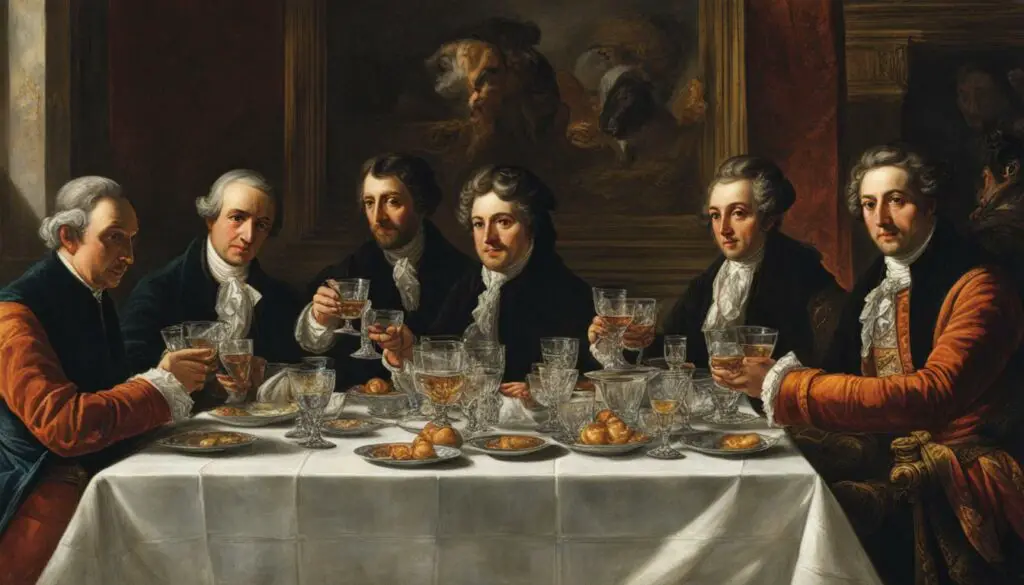
While toasting with an empty glass is considered bad luck in many cultures, there are specific steps that can be taken to avoid any negative consequences. In the Czech Republic, toasting is a highly ritualized process. One must individually toast the health of each person at the table, maintain eye contact, avoid spilling the drink, refrain from crossing their arm with someone else’s, and touch the glass to the table before taking a drink. Following these steps is believed to prevent a curse on one’s sex life. Similar superstitions exist in France and Germany, where breaking eye contact during a toast can result in seven years of bad luck in the bedroom.
Toasting customs and beliefs vary greatly across cultures, but they all highlight the importance of paying attention to the details and showing respect during this celebratory act. Whether it’s following specific rituals or avoiding certain actions, the goal is to ensure good luck and avoid any negative consequences.
“In the Czech Republic, toasting is a highly ritualized process. One must individually toast the health of each person at the table, maintain eye contact, avoid spilling the drink, refrain from crossing their arm with someone else’s, and touch the glass to the table before taking a drink.”
Superstitions in the Czech Republic
In the Czech Republic, toasting is taken very seriously. It’s believed that each person at the table should be individually toasted to wish them good health. Eye contact is essential during the toast, as breaking it is thought to bring bad luck. Spilling the drink while toasting is also seen as unfortunate. Additionally, it’s important not to cross arms with someone else during the toast, as it is believed to disrupt the positive energy of the moment. Finally, it is customary to touch the glass to the table before taking a drink, signifying respect and avoiding any potential curses.
| Belief | Custom |
|---|---|
| Toasting to good health | Individually toasting each person’s health |
| Eye contact | Maintaining eye contact during the toast |
| No spilling | Avoiding spilling the drink while toasting |
| Avoid crossing arms | Refraining from crossing arms with someone else during the toast |
| Touching the glass to the table | Showing respect by touching the glass to the table before drinking |
Following these customs is believed to prevent a curse on one’s sex life and ensure a positive outcome from the toast. Similar superstitions exist in other countries like France and Germany, where eye contact during a toast is crucial to avoid bad luck in the bedroom. These beliefs and customs add depth and meaning to the act of toasting, making it more than just a simple raise of the glass.
To Drink or Not to Drink
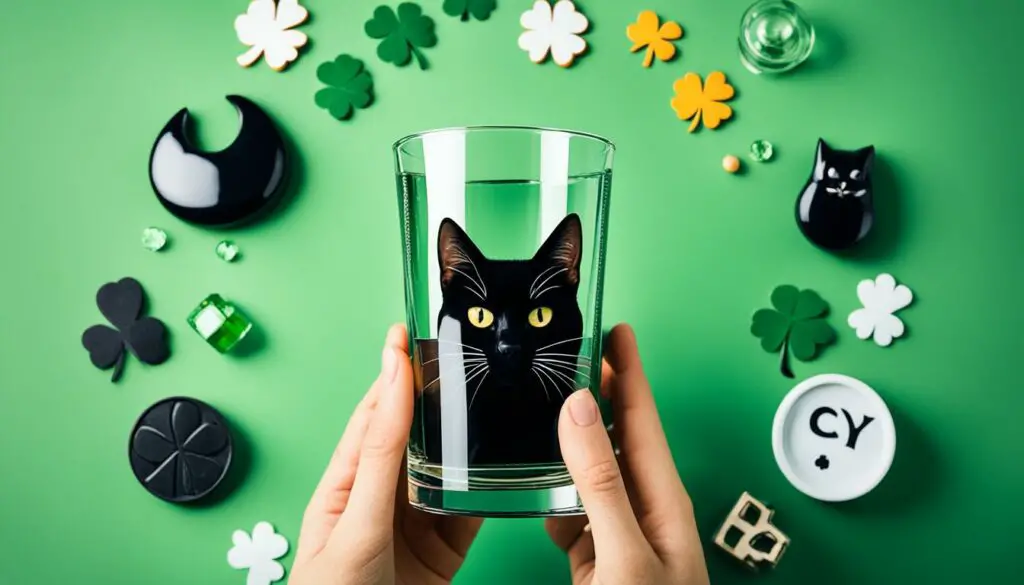
The question of whether to drink or not during a toast can vary depending on cultural customs and personal choice. In some situations, it may be expected and impolite to refuse a drink during a toast, even if you do not consume alcohol. Non-drinkers may opt to lift their glass to their lips without actually drinking the liquid as a way to participate in the tradition. It is important to be aware of the drinking etiquette and expectations within a particular culture to navigate toasting appropriately.
Drinking Etiquette and Superstitions
In many cultures, toasting is a ritual that involves the consumption of alcohol. However, the decision to drink or not during a toast can have various implications. Drinking alcohol during a toast is often seen as a gesture of participation and camaraderie. It shows that you are fully engaged in the celebration and willing to share in the communal experience. On the other hand, refusing to drink during a toast may be perceived as a sign of disrespect or non-participation, depending on the cultural context.
Beliefs about toasting with an empty glass can also influence the decision to drink. As mentioned earlier, toasting with water or an empty glass is seen as bad luck in many cultures. This superstition has led some individuals to avoid drinking during toasts altogether, as they do not want to risk attracting negative energy or ill fortune.
Ultimately, the decision to drink or not during a toast is a personal one. It should be based on cultural understanding, individual beliefs, and personal preferences. It is important to respect and consider the customs and expectations of the culture you are in, while also staying true to your own values and comfort level.
The Role of Personal Choice
While cultural customs play a significant role in dictating whether to drink or not during a toast, personal choice should not be overlooked. It is perfectly acceptable to politely decline a drink during a toast if you do not consume alcohol for personal or health-related reasons. Respectfully and gracefully declining a drink can be done without causing offense, by simply raising your glass and participating in the toast without consuming the liquid.
Similarly, if you choose to participate in the act of toasting but do not wish to consume alcohol, you can opt for non-alcoholic alternatives or simply toast with an empty glass. This allows you to embrace the spirit of the celebration while still adhering to your personal preferences.
Adding Sparkle to Toasts in Mexico
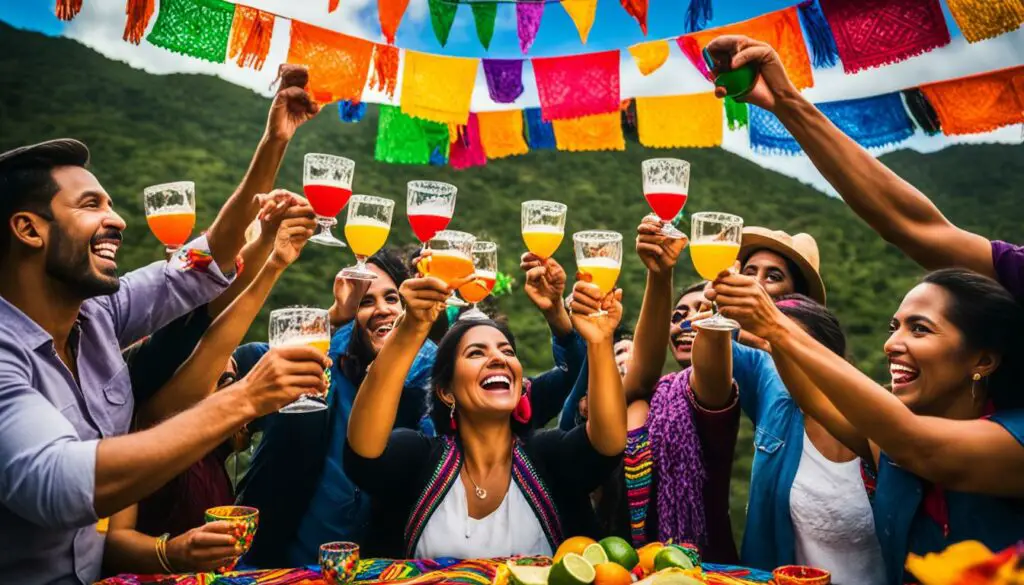
In Mexico, toasting on New Year’s Eve carries a special tradition that adds an extra element of excitement and anticipation to the celebrations. Mexicans believe that by adding a gold ring to a glass of Champagne, they can bring good fortune, particularly in terms of financial prosperity, in the coming year.
The act of dropping the gold ring into the glass is seen as a symbolic gesture, an offering to attract wealth and abundance. This tradition reflects the cultural significance of toasting in Mexico, where it is not just a simple gesture of celebration but also an opportunity to manifest positive outcomes in the future.
However, care must be taken not to swallow the ring while enjoying the toast. Participants in this tradition are reminded to savor the moment while still being mindful of the small piece of jewelry within the glass.
Gold Ring Tradition – New Year’s Eve Toast in Mexico
| Aspect | Explanation |
|---|---|
| Symbolism | The gold ring represents prosperity and financial success. |
| Belief | Mexicans believe that adding the ring to the glass will attract good fortune in the coming year. |
| Custom | This tradition is observed specifically during New Year’s Eve celebrations. |
| Caution | Participants should be careful not to swallow the ring while making the toast. |
This unique tradition demonstrates the importance of toasting in Mexican culture and the belief in the power of symbolism to manifest desired outcomes. It is a testament to the cultural richness and diversity of toasting traditions around the world.
The Consequences of Toasting with Water
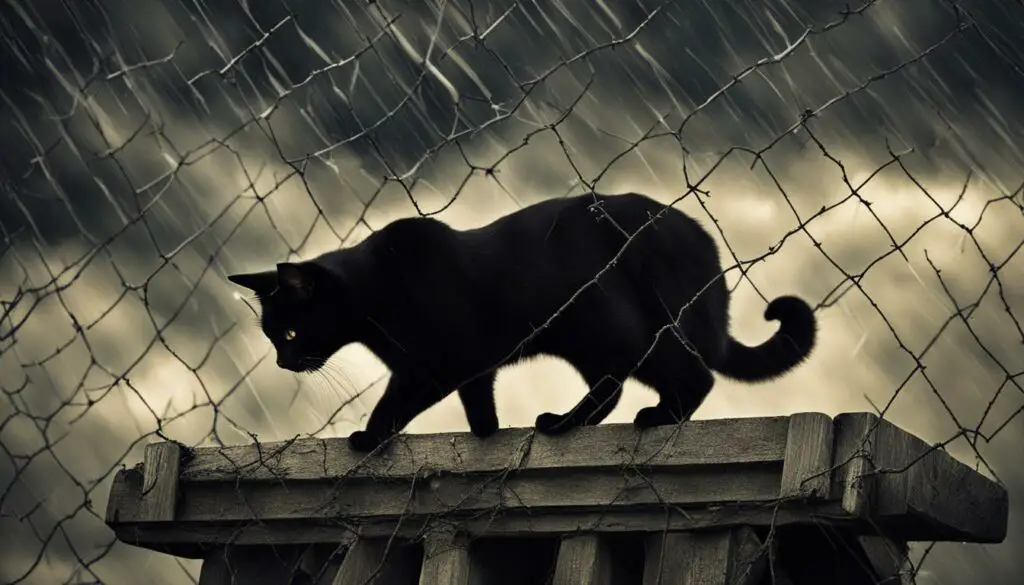
Toasting with an empty glass is often seen as bad luck and is steeped in superstition and history. While the beliefs and customs surrounding toasting vary across different cultures, one common superstition is the consequences of toasting with water. In many cultures, toasting with water is considered unlucky or even detrimental. Let’s explore some of these beliefs and customs:
Spain: Seven Years of Bad Sex
In Spain, toasting with water can result in seven years of bad sex. This belief reflects the idea that toasting with water brings negative energy or disrupts the balance in one’s intimate life. So, in Spain, it’s best to avoid toasting with an empty glass or opt for an alcoholic beverage instead.
France, Germany, and the Czech Republic: The Curse on One’s Sex Life
Similar to Spain, other European countries such as France, Germany, and the Czech Republic believe that toasting with water can lead to a curse on one’s sex life. Maintaining eye contact during a toast is considered crucial in these cultures to avoid inviting bad luck into the bedroom. So, it’s important to make sure you meet the eyes of your fellow toasters while raising your glass, especially if it contains water.
These beliefs and customs associated with toasting with an empty glass highlight the universal nature of toasting traditions and the importance of respecting cultural superstitions. By being mindful of these customs, we can participate in toasting rituals with cultural sensitivity and ensure a positive and fortunate experience.
To Toast or Not to Toast?
The act of toasting holds a significant cultural significance and is a common practice worldwide. Whether it’s a wedding, a birthday, or a special event, raising a glass in celebration is a way to honor and show respect to others. Each culture has its own unique beliefs and customs when it comes to toasting, adding a layer of depth and meaning to the tradition.
Some cultures believe that toasting with an empty glass is bad luck, while others see it as just a myth. This superstition stems from ancient times when toasting with water was associated with death and was believed to bring ill fortune. For example, in Greek mythology, toasting with water symbolized the voyage of the dead to the Underworld.
“Toasting with an empty glass can be seen as wishing bad luck or even death upon someone.”
Despite these superstitions, the act of toasting is ultimately a way to bring people together and create a sense of unity and celebration. Different cultures have their own unique ways of toasting, from clinking glasses and saying “cheers” to reciting traditional toasts and making heartfelt speeches.
It’s important to respect the beliefs and customs of others when participating in toasting. If you’re unsure about whether to toast with an empty glass or not, it’s best to observe and follow the lead of those around you. Ultimately, the intention behind the toast is what matters most – to honor and celebrate the occasion.
So, to toast or not to toast? At the end of the day, it’s a personal choice and a reflection of cultural traditions. Whether you believe in the superstitions and customs surrounding toasting or see them as mere folklore, the act of raising a glass is a universal symbol of joy, celebration, and unity.
Conclusion
The superstitions and beliefs surrounding toasting with an empty glass have a long history and are deeply ingrained in various cultures. It is generally seen as bad luck or even a wish for death by drowning. These beliefs highlight the cultural significance of toasting and the importance of respecting customs and traditions.
Whether one chooses to believe in these superstitions or sees them as mere folklore, toasting remains a universal tradition that brings people together in celebration. It is a way to honor and show respect to others, while also fostering a sense of unity and joy.
So, the next time you raise your glass for a toast, be mindful of the beliefs and customs associated with it. Whether you choose to toast with water, alcoholic beverages, or non-alcoholic drinks, remember to embrace the spirit of celebration and the cultural significance behind this age-old tradition.
FAQ
Is it bad luck to toast with an empty glass?
Toasting with an empty glass is often seen as bad luck and is steeped in superstition and history.
What are the superstitions surrounding toasting with water?
Many cultures believe that toasting with water angers the Gods and brings ill fortune. In Greek mythology, toasting with water was associated with death and considered a wish for bad luck.
What is the cultural significance of toasting?
Toasting is a universal tradition that is meant to celebrate and show respect. It is a way to honor the person being toasted and is practiced in various cultures with different customs and beliefs.
What are the origins of toasting?
The origin of toasting is shrouded in history and myth. Some believe it began with sacrificial libations to the gods, while others suggest it started as a way to ensure drink safety. Regardless, toasting has become a worldwide tradition practiced during celebrations.
Are there any unique traditions around toasting?
Yes, different cultures have added their own twists to the tradition of toasting. For example, in Ukraine and Russia, people write down their wishes for the coming year and burn them before drinking the ashes mixed with Champagne. In Australia, friends playfully insult each other during a toast.
What is the role of the toastmaster in Georgia?
In Georgia, the role of the toastmaster, called the Tamada, is significant. The Tamada leads guests in multiple toasts during a feast called a supra, honoring friends and family, both living and deceased.
How can one avoid the toasting curse?
In different cultures like the Czech Republic, France, and Germany, there are specific steps to follow during a toast to avoid the curse on one’s sex life. These steps include maintaining eye contact, avoiding spills or crossing arms, and touching the glass to the table before drinking.
Should one drink during a toast if they do not consume alcohol?
It depends on the cultural customs and personal choice. In some situations, it may be expected and impolite to refuse a drink during a toast. Non-drinkers may choose to participate by lifting their glass to their lips without actually drinking the liquid.
What is the tradition of adding a gold ring to a toast in Mexico?
In Mexico, it is a tradition to add a gold ring to a glass of Champagne before making a toast on New Year’s Eve. It is believed that this will bring good fortune, particularly in terms of money, in the coming year.
What are the consequences of toasting with water?
To avoid bad luck, it is generally frowned upon to toast with water in many cultures. In Spain, toasting with water can result in seven years of bad sex. Similar beliefs exist in other European countries like France, Germany, and the Czech Republic.
Should one participate in toasting or not?
Whether toasting or not is a personal choice, but it is important to be aware of the cultural significance and customs surrounding toasting in a particular setting. Being respectful of others’ beliefs and customs is paramount.
What is the conclusion regarding toasting with an empty glass?
To conclude, toasting with an empty glass has deep cultural significance and is often associated with superstitions and beliefs. Whether one believes in these superstitions or not, it is important to respect the customs and traditions of others when participating in the act of toasting.
